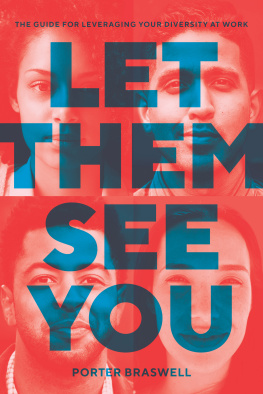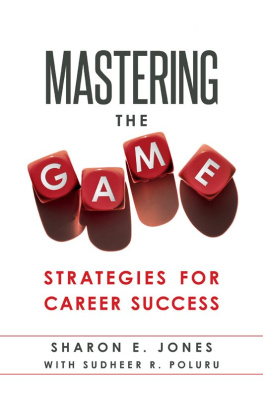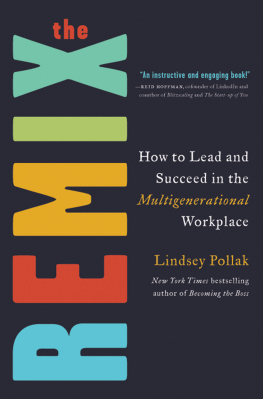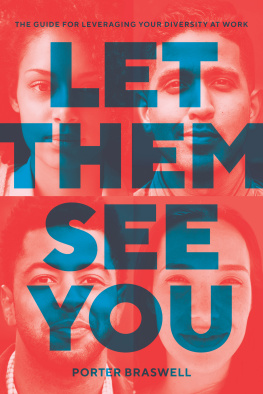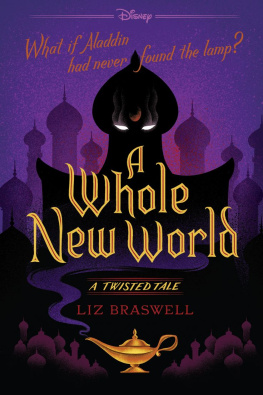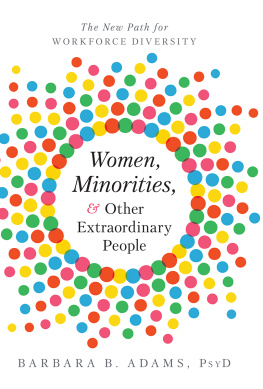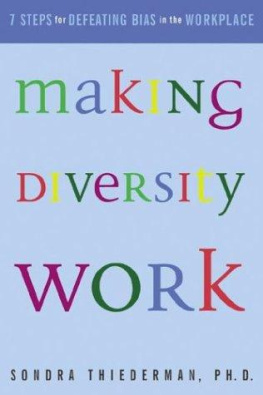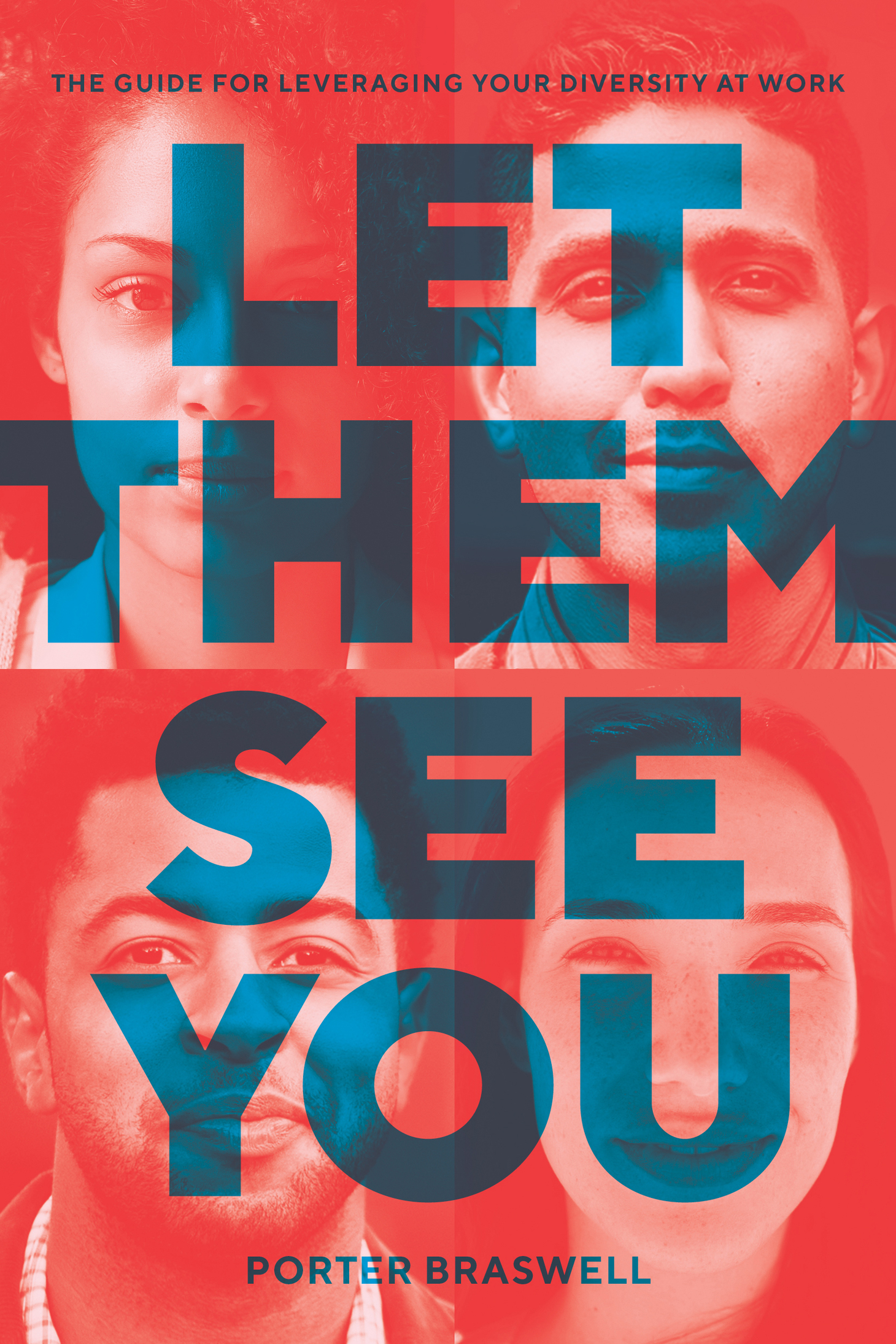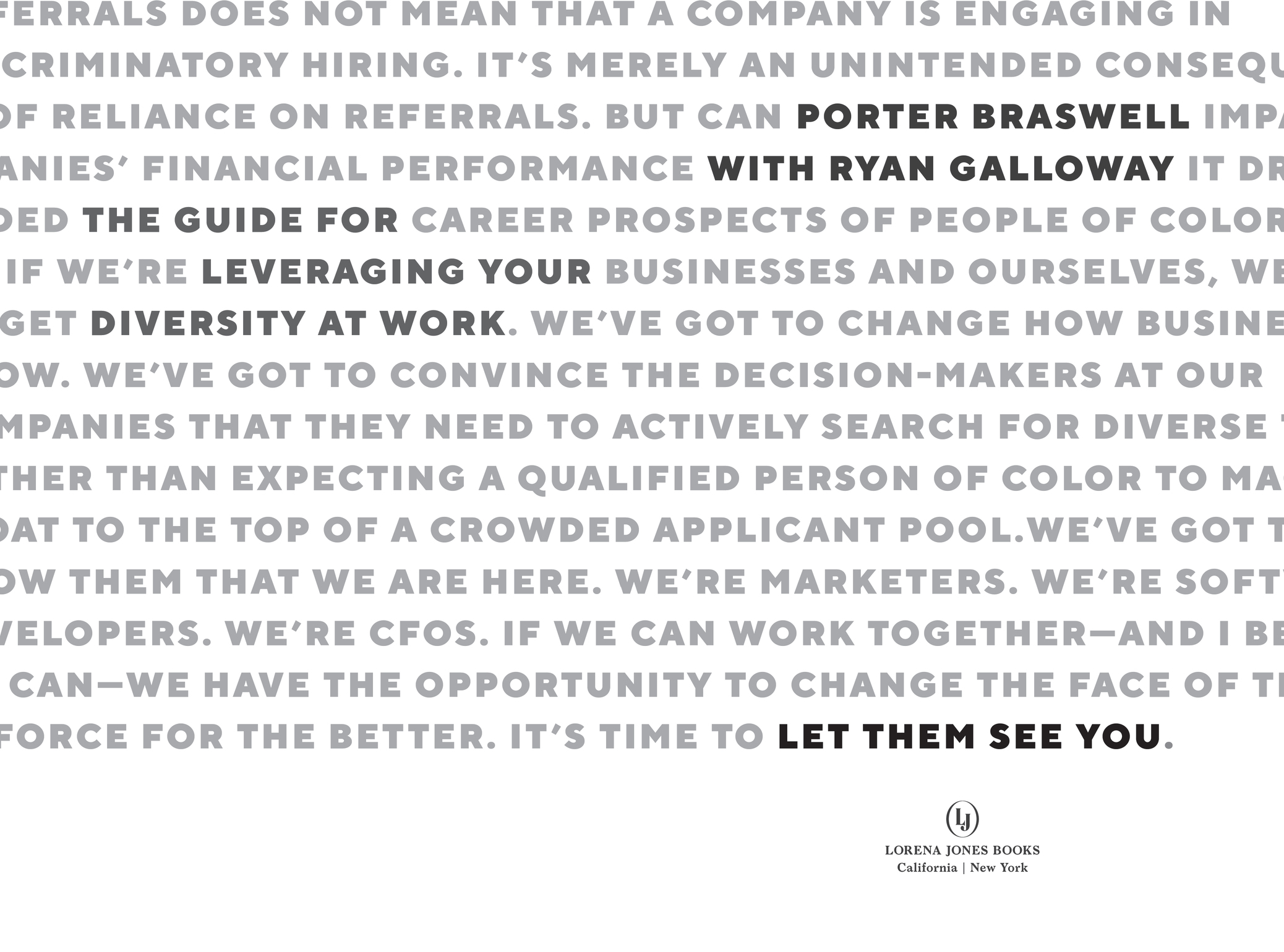Copyright 2019 by Porter Braswell.
All rights reserved. Published in the United States by Lorena Jones Books, an imprint of the Crown Publishing Group, a division of Penguin Random House LLC, New York.
Lorena Jones Books and Lorena Jones Books colophon are registered trademarks of Penguin Random House, LLC.
Names: Braswell, Porter, author.
Title: Let them see you : the guide for leveraging your diversity at work / Porter Braswell.
Description: First Edition. | California/New York : Lorena Jones Books, 2019. | Includes bibliographical references and index.
Identifiers: LCCN 2018042897 (print) | LCCN 2018045267 (ebook) | ISBN 9780399581410 (eBook) | ISBN 9780399581403 (hardback)
Subjects: LCSH: Career development. | Personnel management. | Diversity in the workplace. | BISAC: BUSINESS & ECONOMICS / Careers / General. | BUSINESS & ECONOMICS / Human Resources & Personnel Management.
Classification: LCC HF5381 (ebook) | LCC HF5381 .B6393 2019 (print) | DDC 650.1dc23
Myers-Briggs Type Indicator and MBTI are registered trademarks of The Myers & Briggs Foundation.
Riso-Hudson Enneagram Type Indicator is a registered trademark of The Enneagram Institute.
PROLOGUE
Im Porter Braswell, the CEO and cofounder of a company called Jopwell, a technology platform that helps Black, Latinx, and Native American students and professionals unlock opportunities for career advancement. Under my leadership, Jopwell has formed partnerships with more than one hundred of Americas leading companies and has facilitated tens of thousands of connections between the Jopwell community members and our clients. To date, weve raised more than $11.5 million from the likes of Magic Johnson, Andreessen Horowitz, Y Combinator, Kapor Capital, Cue Ball, and others.
Since we founded Jopwell in 2015, the company has been recognized by Entrepreneur magazine (100 Most Brilliant Ideas), Fast Company (Worlds Most Innovative Companies), and Business Insider (One of the Hottest New York City Companies to Watch). Over the years, Ive received professional awards and recognition that include being named to LinkedIns Next Wave: Top Professionals 35 and Under, Inc. magazines 30 Under 30, Fast Companys 100 Most Creative People In Business, Crains 40 Under 40, Vanity Fairs Future Innovators Index, and Adweeks Young Influencers (the publications annual list of the most innovative minds under age 40).
Before Jopwell, I worked at Goldman Sachs, buying and selling currencies. Before Goldman Sachs, I attended Yale University, where I was a member of the mens varsity basketball team. Working at Goldman Sachs was everything my family had envisioned for me. My father, born in the Bronx with very few resources, became general counsel for a publicly traded utility company and, eventually, a New Jersey state judge. My mother, raised in the suburbs of New York in Westchester County, was an elementary school teacher in the inner city of East Orange, New Jersey. My parents worked so hard to give me access to a great education, and working in the financial industry was their dream for me. But it wasnt my dream. Grateful as I was to them, I wanted more.
In spite of my education, there are many factors that should have led to the failure of Jopwell by now:
Im a Black male, which means I belong to a group that gets less than 1% of venture captial money despite African-Americans making up 11% of the U.S. population. Additionally, all-Black founding teams raise almost half as much money compared to all-white founding teams.
Im nontechnical, and so is my cofounder, Ryan. Tech companies that dont have a technical founder are almost always destined for failure.
I had never started a business before.
I was only twenty-seven when we launched Jopwell.
I quit an incredibly desirable job, and so did my partner; giving up and going back to finance would have been much easier.
Ive written this book because I want to significantly expand the conversation about diversity in the workplace. I believe in the power of technology to change this issue, though I know that there are no easy answers. Weve all seen headlines like these:
Forbes: Apple CEO Tim Cook Is Not Satisfied with Employee Diversity
The Guardian: Why Are Innovative Tech Companies Still Struggling with Diversity?
TechCrunch: Its True, Black Female Founders Receive Basically Zero Venture Capital
I know that many companies are hungry to hire diverse candidates and that the lack of diversity is a problem they care about and feel responsible for changing. Diversity is also good for business. But our national conversation about this subject is stuck in a rut.
To start to change that, Im going to share the success stories of others as well as my own. This book will bring you face to face with real-world strategies for overcoming common obstacles for people of color, and it will also teach you the lessons that Ive learned from some of my influential mentors, including people such as Magic Johnson (NBA legend and NBA Hall of Fame inductee) and Mitch and Freada Kapor (VC investors and activists in the field of organizational culture and diversity).
When we first started Jopwell, we intentionally decided not to refer to our community as diverse. We felt this diluted our mission and, instead, we decided to refer to our community as Black, Latinx, and Native American. Even with this specification, we understood that racial and cultural identity is complicated, varied, and personal. We use the word Black to capture the many and very different cultures that fit underneath the umbrella term. In the same vein, we use the term Latinx so we can be as inclusive as possible to all identities in that spectrum. We believe that in America, being Black creates shared experiences for all those who identify as such. At the start of 2017, we changed from using Latino to Latinx as we wanted to be gender neutral and more progressive in the way we discussed our population.
Throughout the book, Ive used the term people of color, or POC, because, in corporate America, the most underrepresented groups are POC. While POC is an umbrella term that doesnt allow us to discuss the nuances of each unique culture, it does allow for a dialogue detailing practical advice that minorities can implement and leverage in the workplace to realize their potential. As a Black American male, I, too, would rather not be categorized under such large umbrella terms, but for the purpose of this book and in order to provide the most practical advice to the largest audience that historically hasnt been seen in the workplace, I use the term POC.
The practical advice presented throughout this book is meant to help you overcome challenges and obstacles that arise while working with naive and sheltered colleaguesnot racist colleagues. Racism still existsin all locations. If you dont believe me, read my LinkedIn post on what happened to me on my subway ride home in New York City (linkedin.com/pulse/things-still-happen-porter-braswell).

